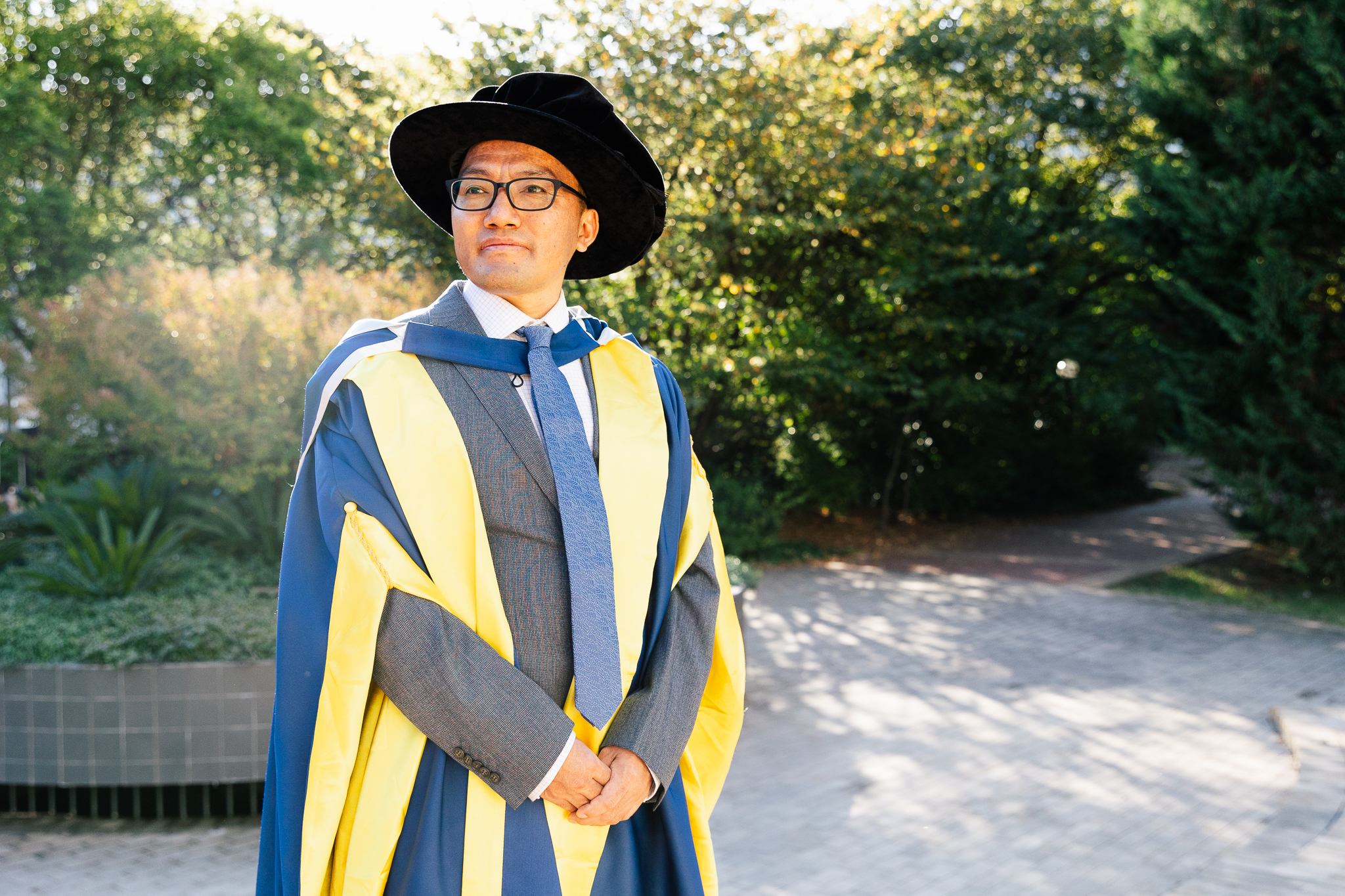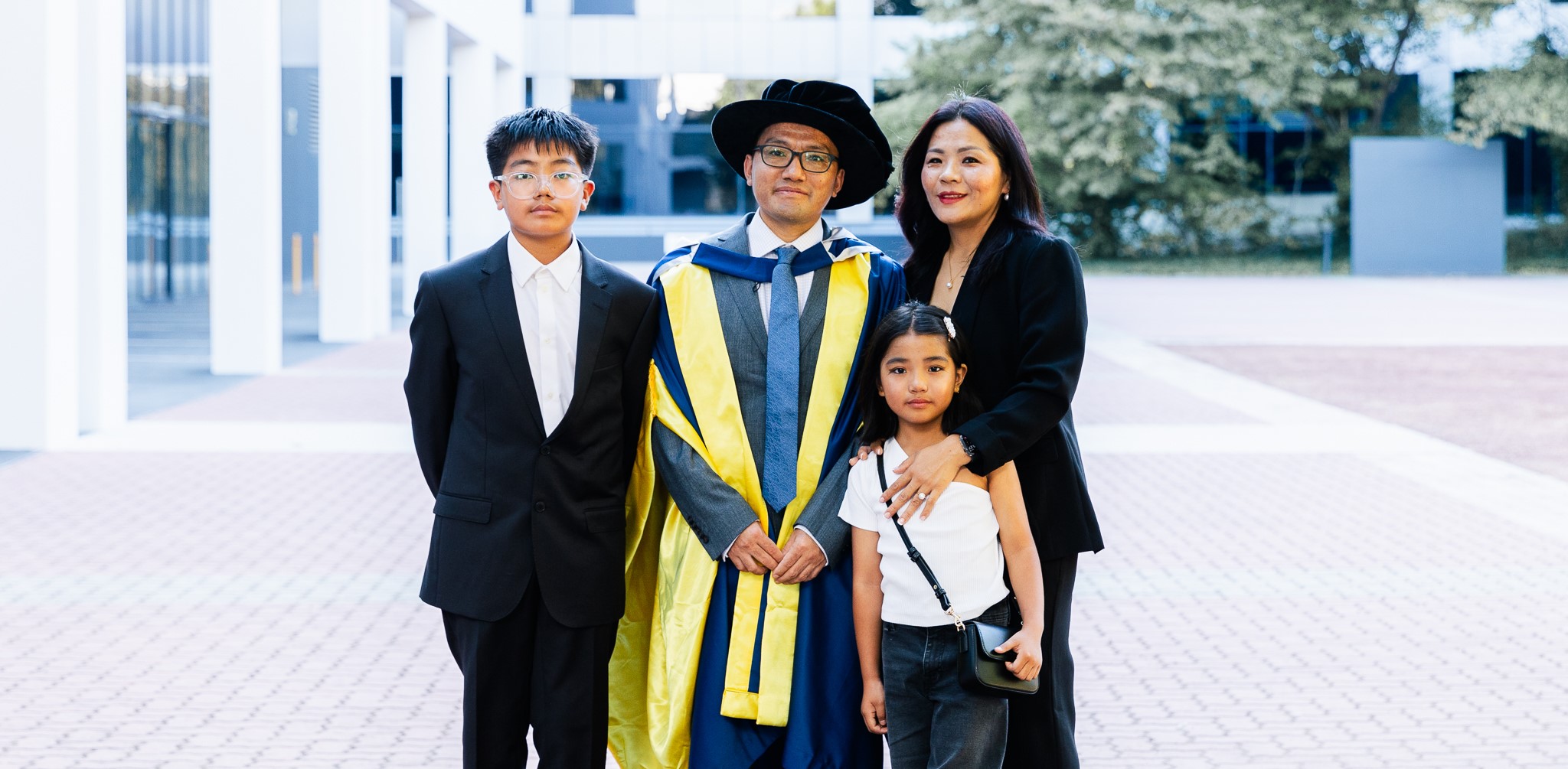Alumni Stories
Grads 2024: Ugyen Tshering
It’s hard to pinpoint what makes Dr Ugyen Tshering’s journey so remarkable – whether it’s the fact that he’s now attained a doctorate, despite only starting formal schooling at 12, or how he worked nightly as a COVID-19 cleaner at the Canberra Hospital for a number of years while studying, clocking a mere five hours of sleep at the best of times.
Ugyen faced nearly insurmountable challenges to achieve an education, with the hope of improving the school system in his home country of Bhutan. Now he also hopes that his story can inspire others who are struggling.
At 12 years old, Ugyen was presented with an opportunity that changed the course of his life forever.
“I come from a very rural part of Bhutan. My whole village had to be resettled later near the India-Bhutan border because of its remoteness. My village didn’t have any schools,” he says. “As the eldest of four children, I helped my parents with the cattle.”
When the Bhutanese government opened a new school in a neighbouring village, many of Ugyen’s friends were set to go there. His father was sceptical of his learning abilities at this age, but Ugyen persisted.
“I begged him: Give me a chance,” Ugyen said.
And so, he was allowed to start kindergarten, at the age of 12.
“The school was very accepting. Anyone who wanted to get admitted was welcome, regardless of their age. There were many who were older than me,” Ugyen says.
He quickly progressed through primary school learning.
“I enjoyed every minute, I was curious,” Ugyen says.
Despite now being a full-time student, Ugyen continued working to support himself and his family, toiling on construction sites, cleaning roads and doing other odd jobs during winter holidays so he could afford to attend school the next semester.
In Year 12, he won a government scholarship to study in India, where he attained a bachelor’s degree in English from the University of Pune.
Upon his return home, Ugyen took the Bhutanese civil service examination, leading to his selection as a lecturer at Sherubtse College, at the Royal University of Bhutan. Here, he worked as an Assistant Lecturer in English, developing and teaching undergraduate and postgraduate English courses.
“I studied English as a second language – then all of a sudden, I was expected to teach it,” Ugyen says.
“I didn’t want to do a disservice to my profession and to my students as their teacher, so I started working harder. That is what inspired me to do my masters.”
Ugyen studied a Master of Teaching English as a Second Language from Flinders University, South Australia.
Ever curious to learn more, Ugyen began looking into opportunities to complete a PhD – he wanted to contribute to academia and publish research that could have an impact on the Bhutanese schooling system.
“I struggled a lot as a reader and as a learner of English. That challenged me to go beyond what I knew,” Ugyen says.
“I realised that there were many ways to learn and to teach English – this is what inspired me to become a scholar.”

He developed his thesis around the concept of critical reading – an area he realised was being misrepresented in Bhutanese schools. Through his initial investigations with Bhutanese teachers, he found that their understanding of the term ‘critical reading’ differed to the internationally held definition.
“In recent times there have been reports that most of our students aren’t able to read critically, and there have been some issues with teaching methodologies and curriculum,” he said.
“From a global perspective, critical reading refers to the ability to look at a text from multiple perspectives. I came to realise that in the Bhutanese context, it is assumed that ‘critical reading’ equates to literal comprehension – the ability to understand what texts actually mean.
“We have to go beyond the text for reading in the 21st century. So, my focus became bringing our school system to that level.”
For this process, Ugyen worked very closely with teachers of Year 9 English in Bhutan, to understand where they were at, and what could be done differently to bring them along on the journey.
He knew he was on the right track, when his work was embraced by teaching colleagues.
“When I speak to other teachers who were not part of my study, they are interested in the topic. They ask, ‘how can I understand?’” Ugyen says.
His PhD proposes strategies and models to approach critical reading in an integrated way – which, he hopes, can help transform this area of the Bhutanese schooling system, and lead to better outcomes for students.
He credits his supervisors, the Faculty of Education’s Dr Maya Gunawardena and Dr Kate Wilson for their support in bringing his research to life.
Ugyen’s PhD journey was not without challenges, but these never threatened to derail his work. In fact, he says they spurred him on to work harder.
Ugyen started his PhD in 2020, a time plagued by COVID-19 lockdowns, and rife with fear and uncertainty as the then little-known virus swept the world.
As a self-funded student, he found himself working as a full-time COVID-19 cleaner at Canberra Hospital to make ends meet, a job few others wanted to take a risk on.
His shifts started at 10.30pm, and he worked until 6.30am, six nights a week.
“I would get home, clean up and have breakfast. Then start my reading, writing and meetings with my supervisors. Sometimes I would only get two to three hours of sleep,” Ugyen says.
COVID-19 presented another unanticipated challenge, when his family could not join him in Australia.

“I was initially going to bring my two kids with me when I came here in 2019, but there were some complications in the process. The school admissions required a permanent address – but I didn’t have one,” Ugyen says.
He then moved with the intention of his children following after six months, but a death in the family kept his family in Bhutan even longer. Then, border closures quashed that plan.
He didn’t see his children in person again until 2021.
“With my two kids still in Bhutan, we never knew when we could meet again. That was my constant fear and worry,” Ugyen says.
“It was in December 2021 that I could finally bring them to Australia.”
On his graduation day in March 2024, Ugyen’s wife and family cheered him on from the crowd as he crossed the stage to accept his testamur. Dressed in the customary yellow and blue regalia of a PhD graduand, Ugyen dedicated his achievements to them, and to each obstacle that stood in his way.
“I faced challenges, but all of these challenges motivated me to work harder.”
Story by Kelly White, photos by Tyler Cherry